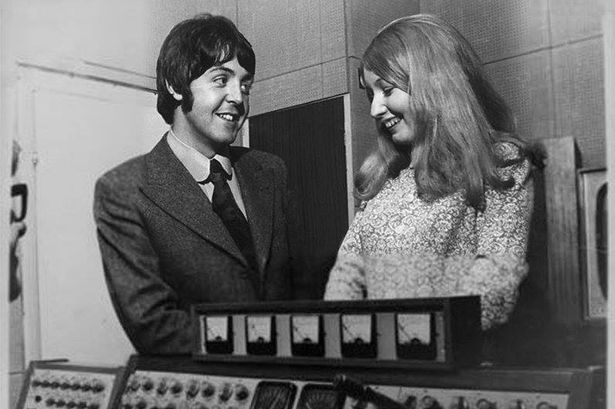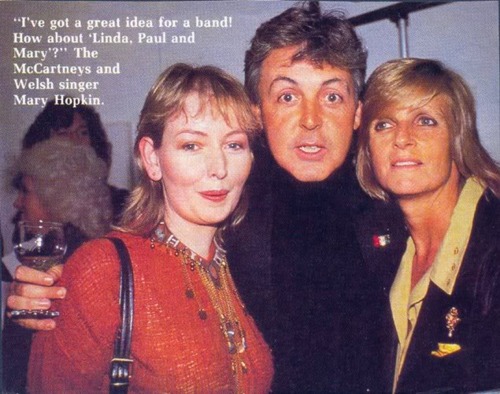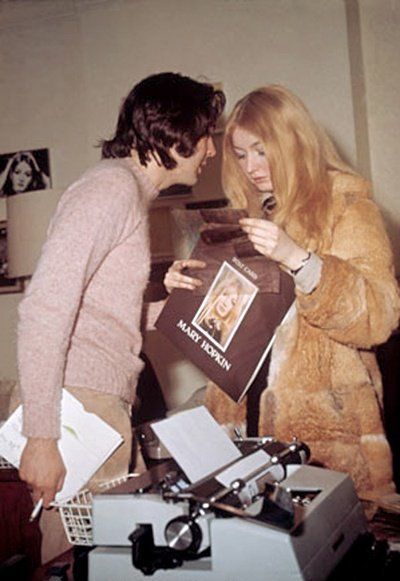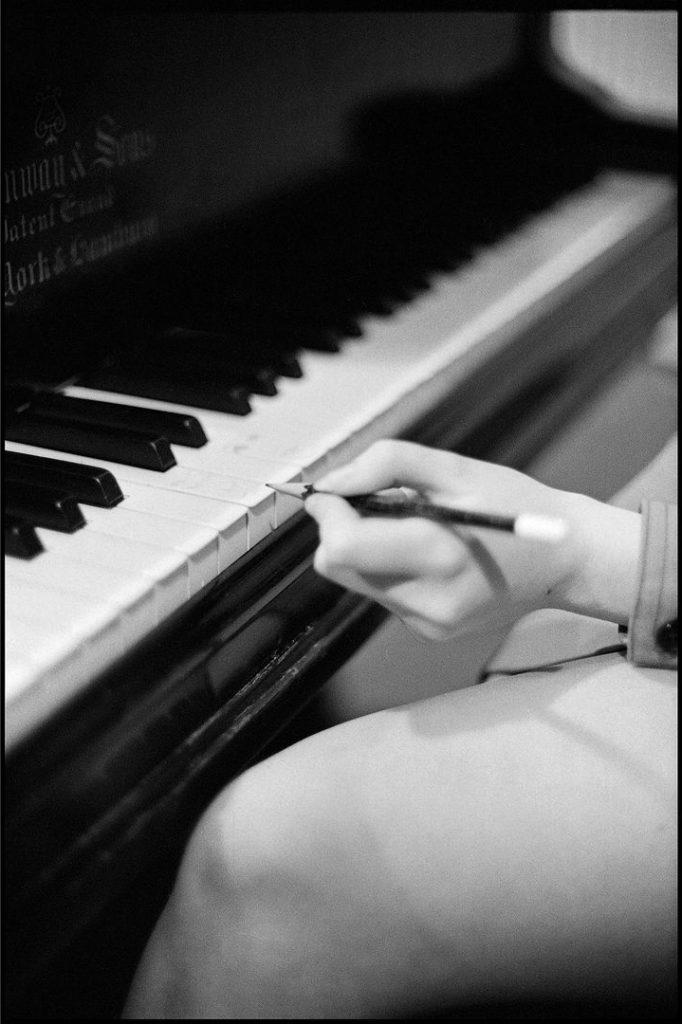"She's A Joan Baez Type, But We'll Soon Alter That"
Jan 01, 1992 • From Goldmine Magazine
From Wikipedia:
Mary Hopkin (born 3 May 1950), credited on some recordings as Mary Visconti (from her marriage to Tony Visconti), is a Welsh singer songwriter best known for her 1968 UK number 1 single “Those Were the Days“. She was one of the first artists to be signed to the Beatles’ Apple label.
Early singing career
Hopkin was born into a Welsh-speaking family in Pontardawe, Wales; her father worked as a housing officer. She took weekly singing lessons as a child and began her musical career as a folk singer with a local group called the Selby Set and Mary. She released an EP of Welsh-language songs for a local record label called Cambrian, based in her hometown, before signing to Apple Records, owned by the Beatles, one of the first artists to do so. The model Twiggy saw her winning the British ITV television talent show Opportunity Knocks and recommended her to Paul McCartney.
Her debut single, “Those Were the Days“, produced by McCartney, was released in the UK on 30 August 1968. Despite competition from well-established star Sandie Shaw, whose single was also released that year, Hopkin’s version became a number 1 hit on the UK Singles Chart. It reached number 2 on the US Billboard Hot 100, where for three weeks it was held out of the top spot by the Beatles’ “Hey Jude“, and spent two weeks at number 1 on Canada’s RPM singles chart. It sold over 1,500,000 copies in the United States alone, and was awarded a gold disc by the RIAA. Global sales topped 8,000,000.
On 2 October 1968, Hopkin appeared at St Paul’s Cathedral in London for the Pop Experience, where she sang “Morning of My Life”, “Turn Turn Turn” and “Plaisir d’amour”. In December that year, the NME music magazine reported that Hopkin was considering a lead acting role in Stanley Baker’s planned film Rape of the Fair Country, which was to be based on Alexander Cordell’s book of the same name. That particular project did not materialise but Hopkin did sing the title songs to two of Baker’s films, Where’s Jack? and Kidnapped.
On 21 February 1969, Hopkin’s debut album, Post Card, again produced by McCartney, was released. It included covers of three songs from Donovan, who also played on the album, and one song each from George Martin and Harry Nilsson. It reached number 3 on the UK Albums Chart, although it proved to be her solitary success in that chart. In the United States, Post Card reached number 28 on the Billboard albums chart.
The next single was “Goodbye“, written by McCartney (credited to Lennon–McCartney), and released on 26 March 1969. It reached number 2 on the UK Singles Chart, number 13 on the Billboard Hot 100, and number 15 on the RPM chart in Canada. Hopkin said she interpreted “Goodbye” as McCartney pledging to stop “micromanaging” her career, since she was uncomfortable with his positioning of her as a pop chanteuse. She also expressed dissatisfaction with her manager at this time, Terry Doran.
Hopkin’s third single, “Temma Harbour”, was a re-arrangement of a Philamore Lincoln song. Her first single not to be produced by McCartney, it was released on 16 January 1970 and peaked at number 6 in the UK and number 42 in Canada. In the US, “Temma Harbour” reached number 39 on the Billboard Hot 100 and number 4 on the magazine’s Easy Listening chart. Along with Donovan and Billy Preston, Hopkin was one of the chorus singers on the Radha Krishna Temple’s 1970 hit single “Govinda”, produced by George Harrison for Apple Records.
Eurovision
In March 1970, Hopkin represented the United Kingdom in the 1970 Eurovision Song Contest, achieving second place with “Knock, Knock Who’s There?” Although she gave a confident performance and sang in a crystal-clear voice, and despite being the pre-contest favourite, Hopkin lost to “All Kinds of Everything”, performed by Irish singer Dana. Produced by Mickie Most, “Knock, Knock Who’s There?” was released as a single on 23 March 1970 and peaked at number 2 in the UK. It was a worldwide hit, selling over a million copies.
Hopkin’s final big hit was “Think About Your Children”, released in October 1970, which reached number 19 in the UK. Hopkin has expressed dissatisfaction with the material produced by Most, who had taken over as her producer with “Temma Harbour”. After appearing in Eurovision, Hopkin wanted to return to her folk-music roots.
After Eurovision
At McCartney’s insistence, Hopkin had recorded a cover of “Que Sera, Sera” in August 1969. Hopkin had no wish to record the song and refused to have the single released in Britain. Initially issued in France in September 1969, it was released in North America in June 1970. The single peaked at number 77 on the Billboard Hot 100 and number 47 in Canada,[citation needed] and was also a hit in Japan, Australia, New Zealand, and Rhodesia (nowadays called Zimbabwe).
The last single to hit the British charts was “Let My Name Be Sorrow”, which reached number 46 in July 1971. It was produced by Tony Visconti, whom Hopkin had met earlier for a Welsh recording of “Sparrow”. “Let My Name Be Sorrow” was a hit in Poland in January 1972.
Hopkin’s second album, Earth Song, Ocean Song, was released by Apple on 1 October 1971. The album was produced by Visconti and included cover versions of songs written by Cat Stevens, Gallagher and Lyle and Ralph McTell, as well as the two title tracks by Liz Thorsen. Hopkin felt it was the album she had always wanted to make, so, coinciding with her marriage to Visconti and with little left to prove, she left the music scene. The album’s single, “Water, Paper and Clay”, missed the Billboard Hot 100. It was Hopkin’s last single for Apple Records, which she left in March 1972.
After Hopkin’s departure from Apple, a compilation album titled Those Were the Days was released in the latter part of 1972. The album featured all of Hopkin’s hits but failed to chart. ”Knock Knock, Who’s There?” was released as a single in the United States and Canada, both countries having been excluded from the first release of that record in 1970. The single reached number 92 on the Billboard Hot 100 and number 11 on the Easy Listening chart in December 1972, giving Hopkin her last US hit.
Television series
Following her appearance in the Eurovision contest, Hopkin had her own peak time TV series, Mary Hopkin in the Land of …, on BBC 1. Created by Eric Merriman, each episode featured Hopkin looking at a different aspect of storytelling through music and dance. The six 30-minute programmes were broadcast in 1970 and were repeated in 1971.
After the hit singles
After marrying Visconti in 1971, Hopkin withdrew from the pop-music scene to have a family. Although reportedly unhappy with show business, she did not stop recording. She travelled to Australia with Visconti in January 1972 and performed at a large outdoor rock festival in South Australia, in addition to giving concerts in several major cities.[citation needed] In March, Hopkin announced her departure from Apple Records; her manager, Jo Lustig, said they were considering offers from “three major [record] companies”. In June, the single “Summertime Summertime” / “Sweet and Low” was released on Bell Records under the name of Hobby Horse. The A-side was a cover of a 1958 song by the Jamies. With Visconti’s assistance, she released the 1972 Christmas single “Mary Had a Baby” / “Cherry Tree Carol” on Regal Zonophone Records.
Hopkin starred in her own, one-off TV special for BBC 1 on 29 July 1972. Titled Sing Hi, Sing Lo, it was billed simply as “light entertainment starring Mary Hopkin”.
Although no other singles or albums came out in her name until 1976, she sang on numerous recordings that her husband produced, such as those featuring Tom Paxton, Ralph McTell, David Bowie (Low), Bert Jansch, The Radiators from Space, Thin Lizzy, Carmen, Sarstedt Brothers, Osibisa, Sparks, Hazel O’Connor, and Elaine Paige. On all of these recordings (and also on her husband’s own Inventory album) she is credited as “Mary Visconti”. During this time, she also appeared on various TV shows such as Cilla Black’s, and various radio programmes. […]
Paul McCartney about discovering Mary Hopkin and recording her first single:
“I heard of Mary first in Liverpool. Justin and Twiggy had come up in their new car… showing off again… you know how it is. Well, we were eating our pudding later that evening and we talked about Opportunity Knows and discovery shows generally and I wondered whether anyone ever got discovered, I mean really discovered, on discovery shows.
Then Twiggy said she had seen a great girl singer on Opportunity Knocks and (luckily as it turned out) this was the time we were looking around for singers for Apple Records.
When I got back to London next day, several other people mentioned her, so it began le look as if Mary really was something. Twiggy’s not soft.
So I got her phone number from the television company and rang her at her home in Pontardawe somewhere in Wales, and this beautiful little Welsh voice came on the phone and I said, “This is Apple Records here; would you be interested in coming down here to record for us?
She said, “Well. ‘er, would you like to speak to my mother?” And then her mother came on the line and we had a chat and two further telephone conversations, and later that week Mary and her mum came to London.
We had a nice lunch and went to Dick James’ studios in Oxford Street and I thought she was great.
But at the same time, I thought she was very Joan Baez – a lot of Joan’s influence showed. However, Mary said she could do other things and I agreed that there was no limit to her possibilities. There couldn’t be a limit because she was very together Wallas.
Well… a long time early, maybe a couple of years ago, I’d first heard “Those Were The Days” when Gene (Raskin) and Francesca, American singers, sang it in the Blue Angel in London and I’d always remembered it.
I’d tried to get someone to record it because it was so good. I’d hope the Moody Blues might do it but it didn’t really work out and, later in India, I played it to Donovan who loved it, but didn’t get around to doing it.
We rang Essex Music, the publishers of the song, but they didn’t know anything about it other than that they owned the song. They had no lead-sheets, no demos. But David Platz of Essex, nice man, sent to America and we got the demo and everything.
I showed Mary how I thought the song should be done and she picked it up very easily — as if she’d known it for years.
At first though, she was singing it as if she didn’t mean it which was strange for Mary, very strange.
But it was her first time in the studio and it can be frightening. After a few tapes, I kept showing her the way she should sing it and generally worked on it and suddenly she got it and we just put a tambourine on it and went home.
She really is the girl next door — the real thing; kind and quiet and she blushes and smiles shyly.
It’s like when she says, “Yes – I go out with boys but it’s just kissing.” Great. It’s due to her background. Normal.
Her parents are good solid Welsh parents, her father works for the local council and her mother is a very intelligent woman, so we are going to look after Mary and make sure no harm comes to her.
Work starts on her album soon and we are going in all kinds of directions as she’s capable of singing anything.
I’d like to hear her shout. That would be good. To hear her really shout. I know she can. Everyone can.”
Paul McCartney – Interview with Melody Maker, September 14, 1968















Mar 01-02, 1969 • Songs recorded during this session appear on Goodbye / Sparrow
Recording "Those Were the Days"
Late July 1968 • Songs recorded during this session appear on Those Were The Days / Turn! Turn! Turn!
Early October 1968 to early December 1968 • Songs recorded during this session appear on Post Card (UK version - Stereo)
Recording "Those Were The Days" in other languages
September 1968 ? • Songs recorded during this session appear on Le Temps Des Fleurs (Those Were The Days) / Turn! Turn! Turn!

Notice any inaccuracies on this page? Have additional insights or ideas for new content? Or just want to share your thoughts? We value your feedback! Please use the form below to get in touch with us.
Diane Anderson • 4 years ago
I still love her...Sings like a sparrow !